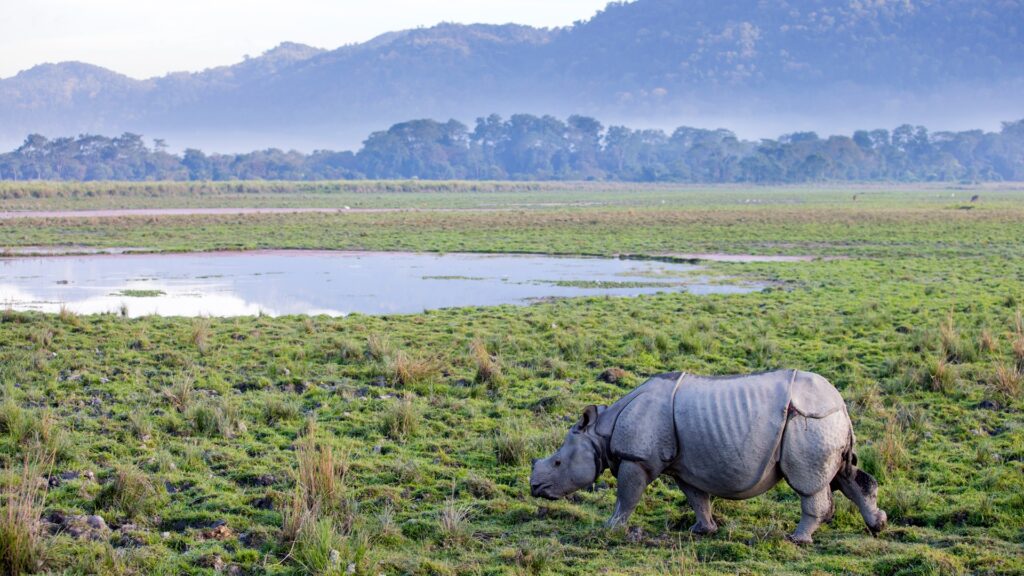Kaziranga National Park & Tiger Reserve, located in the northeastern state of Assam, has long been a critical sanctuary for wildlife, particularly the Indian one-horned rhinoceros. Known for its biodiversity and ecological importance, the park has also been a prime target for poachers over the years. However, under the leadership of Field Director Sonali Ghosh, the Assam government has adopted several proactive measures aimed at curbing poaching activities, transforming the park into a formidable stronghold for conservation.
Sonali Ghosh, who has played a pivotal role in overseeing the protection of the park, emphasized that the efforts to curb poaching have become more robust and coordinated in recent years. She highlighted the increased support from local authorities, law enforcement agencies, and wildlife protection units, which have all been instrumental in safeguarding Kaziranga’s rich biodiversity. With a surge in poaching activities posing a serious threat to the region’s wildlife, the park has faced challenges, especially with illegal hunting targeting rhinos, tigers, and elephants.
One of the key actions taken by the Assam government, as pointed out by Ghosh, is the strengthening of security within and around the park. The park now boasts an extensive network of patrolling units that work round the clock to deter poachers. Specially trained forest guards, along with local police and army personnel, have been deployed to prevent illegal activities. These guards are equipped with modern technology, including night-vision cameras and drones, which help monitor the vast park area, especially in remote regions where poaching activities have been prevalent.
In addition to enhanced surveillance, Ghosh mentioned that the park authorities have focused on improving intelligence gathering to anticipate and disrupt poaching networks. Kaziranga’s proximity to international borders has made it a hotspot for cross-border poaching, and the government has responded by strengthening cooperation with neighboring countries and wildlife agencies to address this issue. The collaborative approach has resulted in better coordination, leading to several successful arrests and the confiscation of illegal wildlife products.
Kaziranga’s protection efforts are not limited to physical security; they also involve improving the welfare and livelihood of the communities living around the park. Ghosh noted that poaching is often driven by poverty and lack of awareness, so the government has initiated programs aimed at empowering local communities. By providing alternative sources of income, such as ecotourism, sustainable agriculture, and local handicrafts, the government has managed to reduce the dependency of these communities on poaching. The Assam government has also been conducting awareness campaigns to educate people about the value of wildlife conservation and the consequences of illegal poaching.
Furthermore, Ghosh underlined that the judicial system has also played an essential role in supporting the government’s efforts to combat poaching. Strict penalties and a fast-track judicial process for poaching-related offenses have made poaching a high-risk activity. This has acted as a strong deterrent to individuals who might otherwise have been tempted by the lucrative illegal wildlife trade.
The results of these combined efforts are evident. Kaziranga has witnessed a steady decline in poaching incidents over the years, with the population of the one-horned rhinoceros steadily increasing. The park, which once lost several of its rhinoceros to poachers annually, has reported a significant drop in the number of rhinos killed for their horns. These achievements are a testament to the effectiveness of the government’s proactive measures and the dedication of the park’s staff and local communities.
Sonali Ghosh expressed optimism about the future of Kaziranga National Park, stating that while challenges remain, the government’s commitment to wildlife protection is unwavering. She concluded by saying that as long as the support from all sectors continues, Kaziranga will remain a beacon of hope for wildlife conservation and a model for other protected areas across the country. The Assam government’s proactive approach to curbing poaching has undoubtedly set a strong precedent in safeguarding India’s wildlife heritage.


